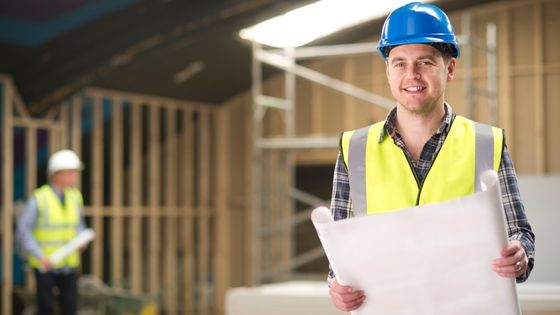Choosing the right flooring material for your business premises can be pretty tricky, especially if you don’t know much about flooring. All the floors in your building will experience normal wear and tear. However, the wear and tear will be more rampant in high traffic areas.
Maybe you want to install new floors for your office lobby to impress potential business owners or stand up to dirt, moisture, and constant use. Or perhaps you’re looking for floor materials that can meet safety and cleanliness standards in your newly opened hospital. Whatever the reason, it’s essential to know the different floor materials for commercial buildings.


Below is a list of the top commercial floor materials you should consider for your business premises:
Polished Concrete
Concrete floors are most common in supermarkets, office retail spaces, warehouses, and shopping complexes such as malls. Polished concrete is a classic and durable floor material that’s becoming more popular among commercial building owners because of its contemporary, clean and stylish look.
This type of floor material also comes with an affordable price tag. Most business owners and commercial building owners prefer installing polished concrete floors. That’s because it significantly reduces the maintenance costs compared to more contemporary floor materials.
The concrete is also very reflective, which can drastically reduce your utility costs. In some industries, lighting represents a significant expense in their utility bills.
This flooring material is also easy to install, and the floor installation process is environmentally-friendly. That’s due to the less wasted materials compared to other floor materials.
Another great benefit of polished concrete materials is that it improves your indoor air quality. That’s because polished concrete floors are not susceptible to mold, dust, mildew, and other indoor allergens.
Epoxy Flooring
The epoxy flooring option is becoming quite popular in the flooring market today. Likewise, more commercial building owners are using epoxy flooring material in their premises. Some commercial settings where epoxy is a better flooring option include:
- Colleges and schools
- Airports
- Food and beverage plants
- Pharmaceutical companies
- Gas and oil manufacturing plants
- Automotive facilities
- Parking facilities
- Hospitals
Epoxy flooring materials are highly resistant to common abrasions and scratches. They are also resistant to normal wear and tear. The epoxy coating can also be tailored to fit the demands of your premises.
Additionally, epoxy flooring has high insulating properties and is highly durable. This ensures it performs well under a wide range of temperatures.
Epoxy coating also comes in different types that are resistant to UV lighting and heat. This makes epoxy flooring an excellent option for high-performance areas such as the lobby. For quality work you can hire industrial flooring contractor such as https://tcfwest.ca
Carpet Floors
One of the most popular floor materials is carpet flooring. A carpet can provide your office space with added warmth during cold climates. If your business is located in a high-traffic area, carpet floors can also absorb the noise.
Unfortunately, carpets are easily damaged and stained. They are also not environmentally friendly. This is because the carpet manufacturing process releases toxic chemicals into the environment.
Additionally, carpet fibers can trap debris, dust, and allergens. This leads to poor indoor air quality. Therefore, it’s less resistant to these allergens than other flooring options.
For example, it’s easy to sweep away and clean a concrete surface without allergens being trapped in the flooring material, unlike in a carpeted floor. If the carpet is exposed to too much moisture, you may need to remove it to avoid the growth of mold and mildew. Generally, carpet isn’t the best material for commercial properties.
However, some small offices prefer carpeting their premises. But, if you don’t want to deal with the above problems, consider installing other flooring options on this list instead of carpet.
Hardwood Flooring
Commercial hardwood flooring is a popular option for most commercial properties. It’s more durable, strong and it can last longer than other types of floors. However, commercial hardwood flooring is more expensive to install.
Likewise, the installation process is also lengthy compared to different types of floors. That said, hardwood flooring is elegant, stylish, and beautiful. It’s also relatively easy to sweep away dust and clean water spills from hardwood flooring than other flooring options such as carpets.
However, hardwood floors are susceptible to moisture, just like carpet floors. Hardwood floors are also vulnerable to cuppings, cracks, buckling, and crowning. These cracks may lead to water leaks and moisture being trapped under the floor surface. Hence, causing expensive problems.
Sadly, you may not see hardwood floors in many offices and other commercial premises. However, this could be the best flooring option for your business.
Vinyl Flooring
When installing new floors for a commercial setting, vinyl is an excellent option for high-traffic areas. It’s a fully-synthetic polymer that can be tailored to look like stone or hardwood floors. However, it comes without the high price tag and the expensive maintenance.
Vinyl comes in three types, which include:
- A luxury vinyl tile (LVT)
- Vinyl sheet flooring
- Vinyl composite tile (VCT).
These types of floors are common in hospitals, schools, hotel lobbies, and offices. Vinyl floors are also durable, moisture-resistant, and come in different colors and patterns. While vinyl flooring material is less expensive than other materials, the tiles could be dented and punctured in some cases.
However, vinyl plank floors quickly fade significantly in areas exposed to UV lighting. Replacing the damaged tiles can be difficult and costly because they are attached using glue. Additionally, vinyl also has a more significant effect on the environment because the material’s manufacturing process leads to the release of volatile chemicals.
Laminate Floors
Laminate wood floors are engineered to be strong and durable. They are also easy to maintain, hygienic, and easy to clean. Another great benefit of laminate floors is that they are often waterproof.
Most LEED-certified healthcare facilities and strict lab environments often have laminate floors because of their durability. While this flooring material is cheaper than commercial hardwood floors, laminate surfaces are more challenging to repair when damaged.
The Best Floor Materials for Your Commercial Building
Choosing the suitable floor materials for your commercial premises isn’t a walk in the park. There are numerous factors to consider, such as the area’s traffic, the properties of the flooring materials, and your business needs. If you’re in doubt about the type of floor materials to choose from, check out our guide above for clarification.
Did you enjoy this article? Check out other blog posts for more informative tips.
















